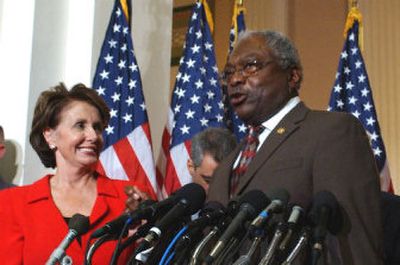Blacks gain congressional clout

WASHINGTON – Beyond sweeping Democrats back into power, the Nov. 7 elections yielded historic political power for blacks.
When the 110th Congress convenes in January, at least four black lawmakers will chair committees in the House of Representatives and 17 will run subcommittees. Forty-two black representatives and one senator – all Democrats – will join the new legislative session.
Rep. James Clyburn of South Carolina will be the No. 3 leader of the House as majority whip, only the second African American to reach that post, after former Rep. William Gray of Pennsylvania.
Shortly after his Democratic colleagues elected him whip on Thursday, Clyburn pointedly noted that there are no black Republicans in Congress.
“What I’m proud of is the diversity of the Democratic Party,” Clyburn said. “Now, 61 percent of the American people say they want Democrats in charge of our government, diversity and all.”
During the election campaign, Clyburn and other black lawmakers resented Republican TV ads that warned of the consequences of Rep. John Conyers, D-Mich., becoming chairman of the House Judiciary Committee and Rep. Charles Rangel, D-N.Y., heading the Ways and Means Committee, the chief tax policy panel.
“The American people in large measure rejected the most derogatory shots the Republicans had to offer,” Clyburn said. “I’m proud of the fact that the American people thought of their own interests and the interests of the country.”
Conyers and Rangel are the longest-serving black lawmakers, with Conyers first elected in 1964 and Rangel sent to Congress in 1970.
Ed Patru, a spokesman for the National Republican Congressional Committee, said the ads targeted Conyers, Rangel and other senior Democrats because of their liberal policies, not because of their race.
“We really don’t care if these guys are male, female, black, red, green, white or orange,” Patru said. “If they’re pushing higher taxes on American voters, if they’re talking about tying up Congress for two years with impeachment hearings, we’ll make an issue out of it.”
The Congressional Black Caucus reached its historical high-water mark with 43 lawmakers in the current session, a number it’ll maintain next year. But its influence will increase as Clyburn assumes his leadership post and Conyers, Rangel and Reps. Bennie Thompson of Mississippi and Juanita Millender-McDonald of California take the helms of House committees.
Thompson is in line to become chairman of the Homeland Security Committee, while Millender-McDonald will lead the Committee on House Administration.
Controversy has clouded the prospects for a possible fifth chairmanship. By seniority, Rep. Jane Harman of California should lead the powerful House Intelligence Committee, but House Speaker-elect Nancy Pelosi has indicated that she’ll pick another Democrat on the panel because of past tensions between them.
Next in line for the intelligence chair would be Rep. Alcee Hastings, a black Floridian who was elected in 1992. Some newspapers and magazines have editorialized against selecting Hastings because of his past impeachment as a federal judge. Eighteen members of the Blue Dog Coalition, a group of fiscally conservative Democratic lawmakers, urged Pelosi in a letter to stick with Harman for the sensitive post.
However that controversy plays out, blacks will have unprecedented clout on Capitol Hill starting in January. When the Democrats lost control of Congress in 1994, most black lawmakers had short tenures and lacked the seniority to chair committees or hold leadership positions.
“It will help the culture of Capitol Hill expand and be enhanced in regard to tolerance,” Hastings said of the increased prominence.
African Americans have never held more than two committee chairmanships in the same Congress, and the number of subcommittees they’ve headed has been far fewer than the 17 they’re likely to lead in January.
“I think it’s historic, but you’ve got to remember that these people didn’t get there as a result of being black,” Rep. Melvin Watt, a North Carolina Democrat and head of the Congressional Black Caucus, said Friday. “They got there as a result of serving in Congress for a number of years and building up substantive knowledge of the issues. They have paid their dues.”
Watt, a former lawyer first elected in 1992, will chair the commercial and administrative law subcommittee of the House Judiciary Committee under Conyers’ watch.
Rep. Corrine Brown of Florida, slated to head the railroads subcommittee of the House Transportation Committee, quoted a famous passage from the Rev. Martin Luther King Jr.’s 1963 address to tens of thousands of civil rights activists in Washington.
“This is the fulfillment of Martin Luther King’s dream that we should be judged by the content of our character, not by the color of our skin,” she said.
In addressing the needs of all Americans, Brown said, lawmakers will be helping black people first and foremost.
“Like I always say, ‘When Americans get colds, African Americans get pneumonia,’ ” she said.